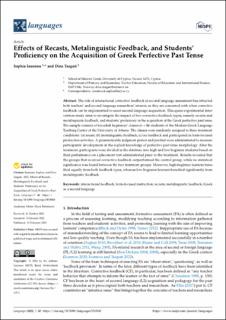| dc.contributor.author | Ioannou, Sofia | |
| dc.contributor.author | Tsagari, Dina | |
| dc.coverage.spatial | Greece | en_US |
| dc.date.accessioned | 2022-05-25T09:24:49Z | |
| dc.date.available | 2022-05-25T09:24:49Z | |
| dc.date.created | 2022-02-21T23:30:21Z | |
| dc.date.issued | 2022-02-21 | |
| dc.identifier.citation | Languages. 2022, 70 (1), 1-25. | en_US |
| dc.identifier.issn | 2226-471X | |
| dc.identifier.uri | https://hdl.handle.net/11250/2996185 | |
| dc.description.abstract | The role of interactional corrective feedback in second language assessment has attracted both teachers’ and second language researchers’ interest, as they are concerned with when corrective feedback can be implemented to assist second language acquisition. This quasi-experimental intervention study aims to investigate the impact of two corrective feedback types, namely recasts and metalinguistic feedback, and students’ proficiency in the acquisition of the Greek perfective past tense. The sample consists of ten adult beginners’ classes (n = 86 students) of the Modern Greek Language Teaching Center of the University of Athens. The classes were randomly assigned to three treatment conditions: (a) recast; (b) metalinguistic feedback; (c) no feedback and participated in form-focused production activities. A grammaticality judgment pretest and posttest were administrated to measure participants’ development on the explicit knowledge of perfective past tense morphology. After the treatment, participants were divided in the database into high and low beginner students based on their performance on a placement test administrated prior to the treatment. Results revealed that the groups that received corrective feedback outperformed the control group, while no statistical significance was found between the two treatment groups. Moreover, high-beginner learners benefited equally from both feedback types, whereas low-beginner learners benefited significantly from metalinguistic feedback. | en_US |
| dc.description.sponsorship | Part of this research was funded by the Cyprus State Scholarships foundation | en_US |
| dc.language.iso | eng | en_US |
| dc.publisher | MDPI | en_US |
| dc.relation.ispartofseries | Languages;Volume 7 / Issue 1 | |
| dc.rights | Navngivelse 4.0 Internasjonal | * |
| dc.rights.uri | http://creativecommons.org/licenses/by/4.0/deed.no | * |
| dc.subject | Interactional feedbacks | en_US |
| dc.subject | Form-focused instruction | en_US |
| dc.subject | Recasts | en_US |
| dc.subject | Metalinguistic feedbacks | en_US |
| dc.subject | Greek as a second language | en_US |
| dc.title | Effects of recasts, metalinguistic feedback, and students' proficiency on the acquisition of Greek perfective past tense | en_US |
| dc.type | Peer reviewed | en_US |
| dc.type | Journal article | en_US |
| dc.description.version | publishedVersion | en_US |
| dc.rights.holder | © 2022 by the authors | en_US |
| dc.source.articlenumber | 40 | en_US |
| cristin.ispublished | true | |
| cristin.fulltext | original | |
| cristin.qualitycode | 1 | |
| dc.identifier.doi | https://doi.org/10.3390/languages7010040 | |
| dc.identifier.cristin | 2004310 | |
| dc.source.journal | Languages | en_US |
| dc.source.volume | 7 | en_US |
| dc.source.issue | 1 | en_US |
| dc.source.pagenumber | 1-25 | en_US |

